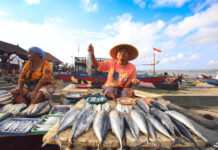SUSTAINABILITY is a buzzword for many but for one organization in Malaysia, it is their vision and passion. This organisation is involved in solutions-driven projects through research, education and training to realise the Sustainable Development Goals (SDGs). It is no surprise that it is ideally located at Sunway University, and is the brainchild of Tan Sri Jeffrey Cheah, who is famed for his sustainable development vision and efforts. Named after Professor Jeffrey Sachs, world-renowned economist, global leader in sustainable development as well as Distinguished Professor at Sunway University, the Jeffrey Sachs Center on Sustainable Development at Sunway University (JSC) is buzzing with activities in an effort to change the sustainability equation. The Petri Dish team speaks to Karen Chand, Director of Strategy and Operations at the Jeffrey Sachs Center who is on top of these activities.
“Asia is becoming an increasingly important region, both economically and environmentally. Tan Sri Jeffrey Cheah’s vision is for Sunway to lead the way to support the advancements in Asia,” said Karen. “As such, JSC also hosts the Asian office of the United Nations Sustainable Development Solutions Network (SDSN) alongside its headquarters in New York and its European office in Paris”.
“The four pillars of sustainability are economy, environment, social and governance, all of which are interconnected and have to engaged in parallel. Our initiatives at JSC encompass all four pillars,” explains Karen, whose own interest is in socioeconomic development, governance, education, and national unity. It is interesting to note that all these areas form are encapsulated within the 17 Sustainable Development Goals (SDGs), that all countries adopted in 2016.
The work at JSC, under the leadership of Prof Sachs, and Prof Woo Wing Thye, Director of the Center, another world-renowned economist, is based on a three-pronged approach – research, education and partnerships. “Our research on sustainable development is solutions-driven. We identify areas in which we are lagging behind in terms of achieving the SDGs, based on data, and we attempt to identify the causes as well as the various options to improve performance.”
An important point of reference is the Sustainable Development Report, an annual publication by the Sustainable Development Solutions Network (SDSN), that provides assessments and trends on how UN member countries are faring in all the 17 SDGs.
In the 2021 report, Malaysia demonstrates an upward trend in four SDGs: No Poverty (SDG1); Affordable and Clean Energy (SDG7); Decent Work and Economic Growth (SDG8); and Industry, Innovation and Infrastructure (SDG9). The five SDGs where Malaysia still faces major challenges, however, are: Zero Hunger (SDG2); Good Health and Wellbeing (SDG3); Gender Equality (SDG5); Life Below Water (SDG14); and Life on Land (SDG15).
These data and trends serve as a reference point for Karen’s team to support areas that require urgent interventions through research and capacity building. “Our research team is made up of subject matter experts in various fields relevant to the SDGs. Given we are part of the larger SDSN global network, we are also able to leverage on experts outside Malaysia wherever necessary, most of whom are among the best subject matter experts on sustainable development in the world, including Professor Jeffrey Sachs himself.”
Karen explains that Malaysia’s carbon emission comes mainly from the energy, transport and agriculture sectors. “So, our research team identifies possible alternative pathways to decarbonise those sectors. Our roadmap undergoes four complementary analytical modelling: technical feasibility, financial feasibility, and socio-economic impact,” says Karen briefly on the research methodology.
One of the milestone research projects is the ASEAN Green Future Project. This project advocates for achieving net zero carbon emissions for the ASEAN region within the 2050-2060 timeframe. Many countries and regions have already committed to a net zero target, including the U.S.A, Europe, Korea, Japan and China. The ASEAN Green Future Project mobilises country teams throughout ASEAN to study the pathways available to support ASEAN’s journey in reaching carbon neutrality.
JSC was founded underpinning Tan Sri Jeffrey Cheah’s belief that the 4th SDG, Quality Education, is the precondition to achieve all the other SDGs. This explains JSC’s strong focus on SDG Target 4.7 that emphasises knowledge and skills needed to promote education in sustainable development and global citizenship. Mission 4.7 is a global effort to promote SDG Target 4.7 in schools worldwide, and was launched on 16 December 2020 by Pope Francis, former UN Secretary-General Ban Ki-moon and UNESCO Director- General Audrey Azoulay. It is no surprise that Tan Sri Jeffrey Cheah was appointed as the Co-Chair of Mission 4.7 alongside Professor Jeffrey Sachs, Monsignor Marcelo Sorondo (Chancellor, Pontifical Academy of Sciences), and Stefania Giannini (Assistant Director-General for Education, UNESCO).
In Malaysia, Mission 4.7 aims to supplement the primary and secondary curriculums with rich content and pedagogical tools to support a deep appreciation for sustainable development. It hopes to develop problem-solvers among the younger generation within a learning environment that is empowering, mind-opening, and thought-provoking with the spirit of global understanding and global peace.
One key area in sustainable development education is data science. Karen explains that data science allows an understanding of the complicated relationships between the different elements of sustainability and enables the identification of efficient intervention points to improve outcomes. “We focus on collecting, processing, and interpreting data correctly”, she says adding also that this contributes to greater transparency and better governance.
JCI also offers both Master’s and PhD programmes in Sustainable Development. “I was part of the first cohort of the Master In Sustainable Development, that was launched in Jan 2019, to experience first-hand our own home-grown programme,” says Karen who graduated in 2020. The pandemic has forced the programme to go online but this has opened doors to international enrolment. Today, the programme has two tracks; an 18-month blended programme and a 12-month fully online programme.
Part of the education is also capacity building for various private sector stakeholders who have their own role to play in supporting sustainability in the country. Customised modules are developed and delivered for various audiences depending on the sectors they represent. JSC has thus far trained executives and leaders from the manufacturing, banking and government sectors.
“Partnership can never be underestimated in our goals to achieve the SDGs. We work with like-minded national, regional and international organisations,” says Karen talking about the 3rd core focus of JCI. Government, civil society, academia and the private sector are crucial partners. To strengthen impact, JSC collaborates with other departments and schools within Sunway University as well as other member institutions of the SDSN Malaysia Chapter, that has 20 members comprising other educational and research institutions.
The leadership, passion and international connections with key stakeholders of both Tan Sri Jeffrey Cheah and Professor Woo is instrumental in making JSC a leader in developing equitable pathways for achieving the SDGs in Malaysia and the wider Asian continent.

















